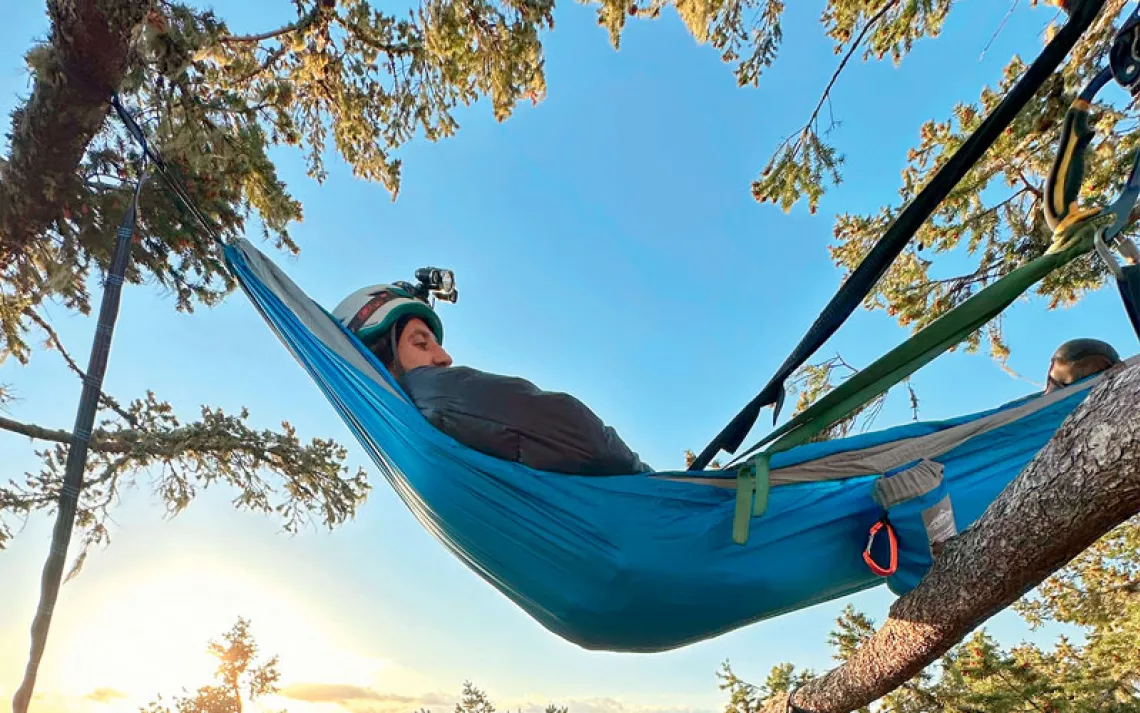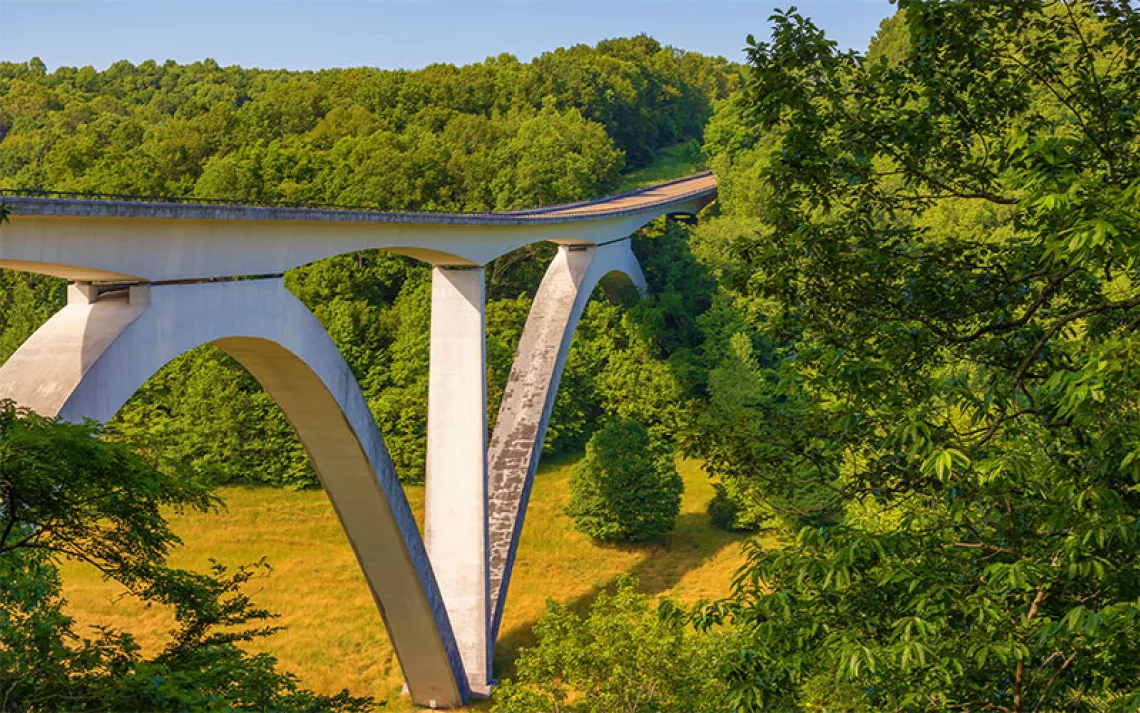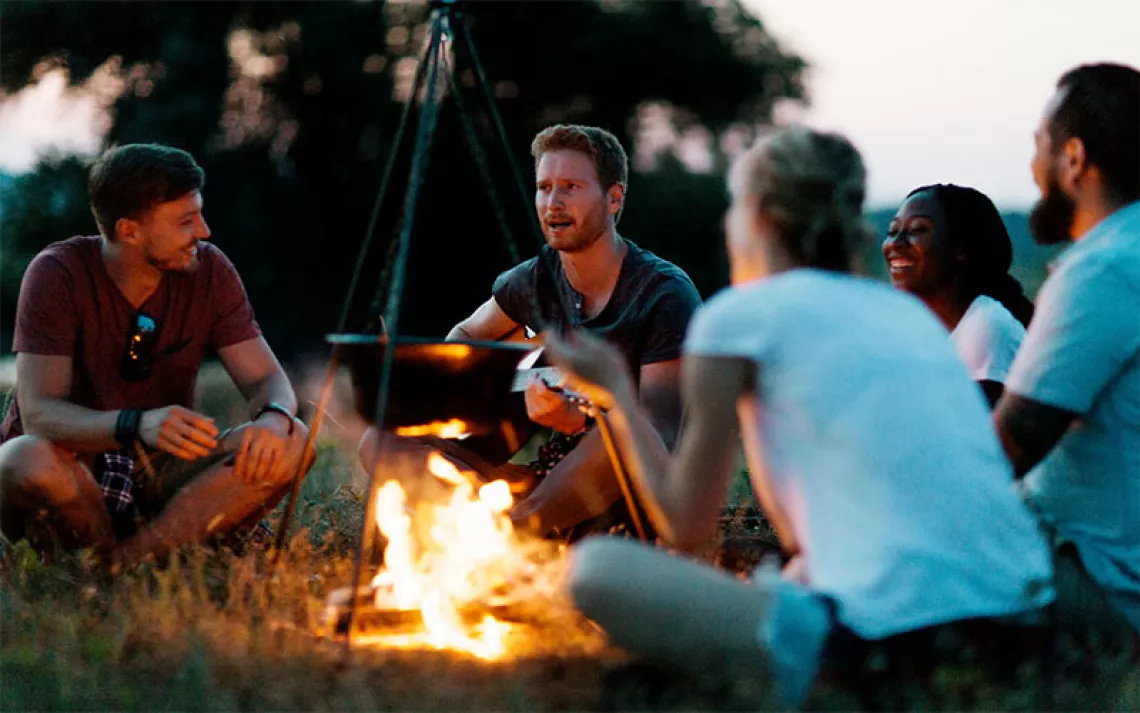How I Learned to Calm Down and Love Camping
My immigrant mom taught me the necessity of hustling; camping taught me the joy of slowing down
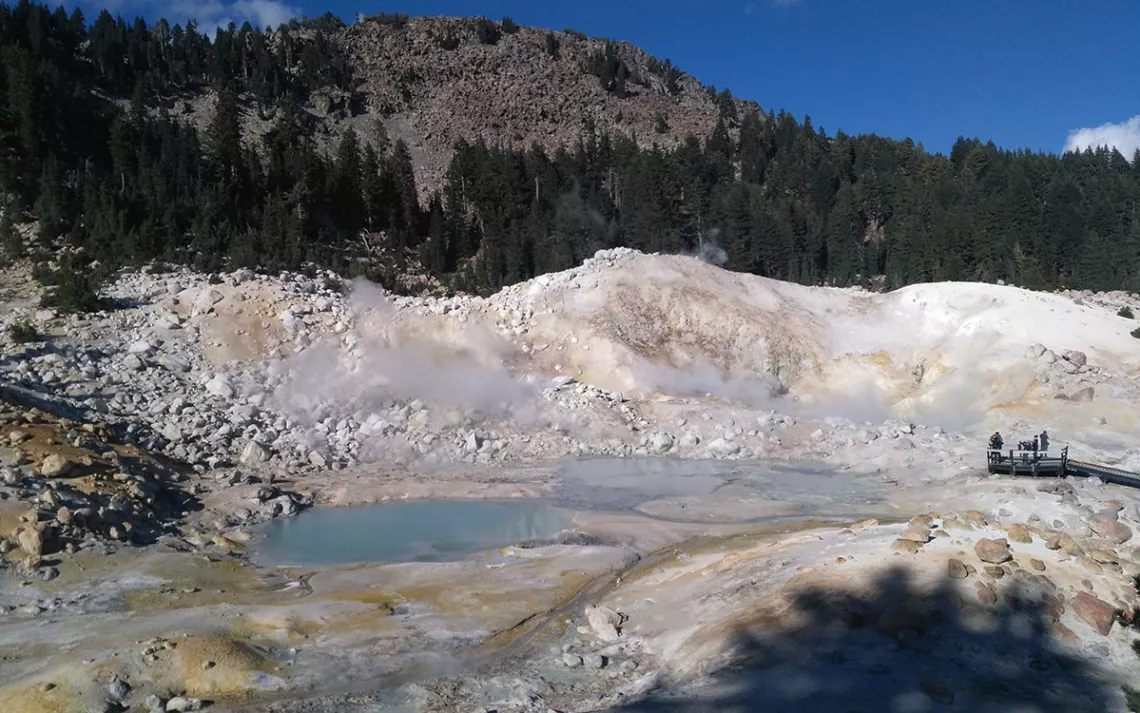
View from the boardwalk at the end of the Bumpass Hell Trail. | Photo by Jenny Qi
As the warm flickering campfire faded, I steeled myself to sleep in the tent. I had dreaded this trip all week, anticipating misery and humiliation. I was 25 and my boyfriend had convinced me to go on my first-ever camping trip in Lassen Volcanic National Park, in Northern California, with people I didn’t know well. I’d barely even hiked on a daytrip before, favoring treadmills over trails, and now I was skipping showers and makeup for three days. Nearly five years into my seemingly interminable PhD, camping also meant I would lose precious time on my dissertation. No one would be able to reach me. “This is going to suck,” I’d bemoaned to a fellow indoorsy friend in the lab where we worked as biomedical graduate students. She suggested I bail, but for me, backing out of a commitment was worse than simple misery.
So here I was, awkwardly hunched in the two-person tent that my boyfriend had ordered three days ago for $20, a tent so small that the rest of the group had guffawed at it, a tiny chihuahua next to their labradors. As I wobbled across the air mattress to get into my crinkly sleeping bag (also ordered three days ago for around $20), I thought of my immigrant mom, who’d spent most of her life working two jobs. She had been right about the absurdity of camping: White people inexplicably cosplaying homelessness, she might have said, if she had lived to learn about cosplaying. Her actual response to seven-year-old me was not far off: “Why would we sleep on the ground when I’ve worked so hard for us to have beds?”
Silly me who’d thought it might be a fun all-American activity. I was too young and culturally isolated to understand that untamed wilderness and purposeless exertion were foreign concepts to my Chinese parents. Like many other children their age, my parents had been sent to the countryside to do hard labor during the Cultural Revolution. My bookish mother in particular associated the outdoors with deprivation and trauma.
After she shot down my childhood camping suggestion, I lost interest too. As I grew older, I understood that my role in our family was to be a good STEM student and to make my parents’ hardships worthwhile. By the time the Lassen camping trip rolled around, my mother had been dead for five years, and I’d become a high-strung, career-driven, fast-walking city rat with no interest in nature despite being a biologist. (This was why I was the kind of biologist peering through a microscope in San Francisco rather than roaming through forests collecting plants.) I was doing more or less what my mother had wanted, but I was beyond burned out and miserable.
What was another weekend’s discomfort in the grand scheme of my existential angst? This was how I found myself in a cheap tent on Labor Day weekend in 2016, inside my sleeping bag with my arms crossed over my jacket.
So this was camping. I was not impressed.
I tried to lull myself to sleep with deep breaths. I couldn’t do my normal bedtime activity of compiling a virtual cart of things I would never purchase. I was alone with my thoughts in the woods: All my regrets about my mother’s last days, anxieties about my uncertain future and the election and the climate, and fears of being murdered like so many unsuspecting couples in true crime podcasts. All dread was welcome in this brain. I shivered in my sleeping bag and waited for sleep to come. And waited. And shivered.
Spoiler: Sleep did not come. Not only had my boyfriend and I underestimated the cold of Lassen in September, but we also realized in the morning that the air mattress prevented us from retaining body heat.
Normally, I would have thought this a disaster—a sleepless night meant I would be slow and unfocused during the day, wasting my limited time on this earth. I would have to trudge through mental quicksand to get myself to be productive. But that weekend, I didn’t have to be productive. I’d left my laptop at home and cleared my schedule for this trip, and I realized giddily that for the first time in years, no one was expecting anything from me for three whole days. I was basically dead to the world. I felt weightless. If this was what camping felt like, I was starting to maybe see the appeal.
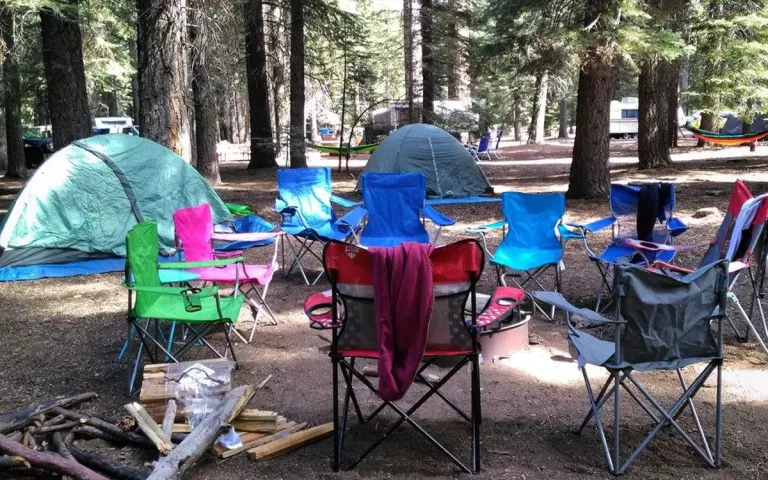
Camping chairs and tents ready for the evening. | Photo by Jenny Qi
Adding to my relief was the group’s lack of firm plans, in contrast to the frenetic pace of trips I planned for myself. We were just there to hang out and enjoy the outdoors, a baffling concept for me. Because of my boyfriend’s and my sleepless night, the group decided to do an easy hike and then stop by the general store so we could pick up hand warmers and blankets. Accustomed to ignoring my own needs, I was both touched and confused that other people would make accommodations for us so readily. To my surprise, they weren’t even mad about our woeful lack of preparation. If anything, they found the situation rather funny.
Having always lived in cities where anything that wasn’t bolted down got stolen, I assumed we would have to put away and set up our sleeping quarters each day, and I dreaded the process. Yet at the news that we would leave everything in our tents, I felt nervous. As we set off for a hike with only our daypacks, I told myself that I was leaving behind nothing of value.
We were headed for Bumpass Hell, named for mountaineer Kendall Vanhook Bumpass, who was leading a group of visitors to the surreal landscape in 1865 when he stepped into an acidic boiling mud pot. His leg was amputated, and he eventually died of sepsis.
Despite Bumpass’s sad fate and my own lack of sleep, I felt oddly content trudging along the sunny dirt path, the group chattering happily in front of me. Periodically, we passed other hikers who greeted us with polite smiles and hellos that we returned. “Trail etiquette,” my boyfriend pointed out, and I marveled at the idea.
In my normal life, I consciously scowled at strangers, triple-checked my locks, and would never dream of leaving my things unprotected while I wandered off. This trip was so different from anything I’d experienced or expected. Maybe camping wasn’t so bad after all? I couldn’t tell if it was just the sleep deprivation, but I thought our path even looked brighter and more saturated than any path I’d seen before. Had I ever noticed the earth beneath my shoes like this—its slight unevenness, how the small muscles of my feet tensed as I walked? Had I ever paid attention to the act of walking rather than whatever I was rushing from or toward?
As we neared our endpoint, I began to notice white wisps of steam and the faint rotten-eggs smell of sulfur. The trees cleared, and I saw the barren white landscape dotted with vivid blue pools and boiling mud pots, bubbling and hissing beneath the boardwalk like cauldrons emerging from the bowels of the earth. We were next to an active volcano! I couldn’t remember the last time I’d felt so delighted.
I retrieved my phone from my pocket to memorialize the moment with a photo, and I realized that I hadn’t once looked at the screen that day. My shoulders felt so relaxed that it was almost unsettling. I inhaled deeply, breathing in the sulfurous mist, listening to the burbling earth, feeling the warmth of the sun against my face. I took the photo and tucked my phone away, trying to memorize this rare sense of calm.
 The Magazine of The Sierra Club
The Magazine of The Sierra Club
